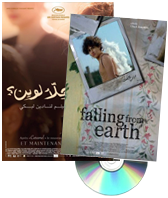Restoration and Preservation
This division includes a collection of Lebanese films preserved in a special hall (feature and short films, 16 and 35 mm). Its purpose is performing storage and primary inventory of the films, and cleaning, restoring and maintaining them.
The division is not allowed to use these films commercially but it can play them in its own movie theaters and lend them to other centers and festivals.
Audio-Visual Media Library
The library includes books, videotapes, CDs, and journalistic publications. A wide hall was put at the disposal of readers. The cinémathèque is currently entering these archives into a special computer program that enables researchers to find the required titles and information instantly.
The library has hundreds of books in Arabic, French, Italian, and English in addition to others in German, Spanish, Russian, etc. and they include referential books, indexes, business guides, and dictionaries among others, as well as writings on the history of cinema, media, TV, photography, scenarios, etc. The videotapes collection includes Arabic and French films and a large number of primary new classical movies. The library also includes dozens of rare periodical magazines dealing with cinema and issued in Lebanon, the Arab world and internationally especially in France and Italy, in addition to a collection of DVDs about the history of cinema and other DVDs that feature broadcasts of renowned actors and directors.
Archives and Documentation

This division handles the collection, indexing and preservation of documents related to Lebanese and Arabic cinema. Today, it includes unique documents which make a precious working material for researchers, historians and journalists.
The archives include documents pertaining to scenario writing, film writing, film shooting, film production, film promotion and distribution, film life, and personal correspondences and documents. The division also has hundreds of original photos from films (Black & White, and Color), and photos of shooting scenes, actors, and directors, in addition to original posters of some important films.
The archives also include press files, press watch files of Lebanese, Arabic and foreign movies, and files prepared by distributors and producers to accompany the launching of a film. Furthermore, the collection holds information on several local, regional and international film festivals, and is mainly comprised of official festival guides, festival journals and awards distribution lists.
Address: Beirut, Glass building attached to the Palace UNESCO, Ground floor.
Phone: 01/807178 - 2









 This division includes a collection of Lebanese films preserved in a special hall (feature and short films, 16 and 35 mm). Its purpose is performing storage and primary inventory of the films, and cleaning, restoring and maintaining them.
This division includes a collection of Lebanese films preserved in a special hall (feature and short films, 16 and 35 mm). Its purpose is performing storage and primary inventory of the films, and cleaning, restoring and maintaining them.  The library includes books, videotapes, CDs, and journalistic publications. A wide hall was put at the disposal of readers. The cinémathèque is currently entering these archives into a special computer program that enables researchers to find the required titles and information instantly.
The library includes books, videotapes, CDs, and journalistic publications. A wide hall was put at the disposal of readers. The cinémathèque is currently entering these archives into a special computer program that enables researchers to find the required titles and information instantly. 
 This division handles the collection, indexing and preservation of documents related to Lebanese and Arabic cinema. Today, it includes unique documents which make a precious working material for researchers, historians and journalists.
This division handles the collection, indexing and preservation of documents related to Lebanese and Arabic cinema. Today, it includes unique documents which make a precious working material for researchers, historians and journalists.